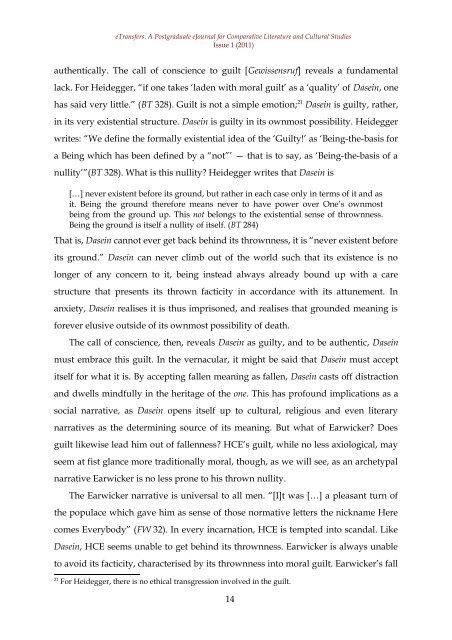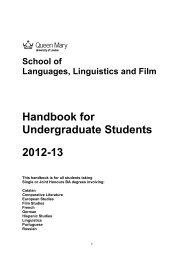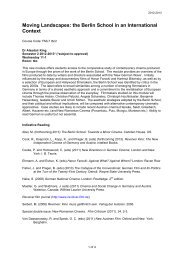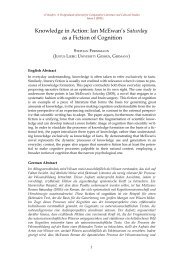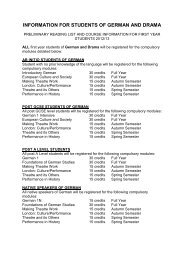Finnegans Wake - Queen Mary, University of London
Finnegans Wake - Queen Mary, University of London
Finnegans Wake - Queen Mary, University of London
You also want an ePaper? Increase the reach of your titles
YUMPU automatically turns print PDFs into web optimized ePapers that Google loves.
eTransfers. A Postgraduate eJournal for Comparative Literature and Cultural Studies<br />
Issue 1 (2011)<br />
authentically. The call <strong>of</strong> conscience to guilt [Gewissensruf] reveals a fundamental<br />
lack. For Heidegger, “if one takes ‘laden with moral guilt’ as a ‘quality’ <strong>of</strong> Dasein, one<br />
has said very little.” (BT 328). Guilt is not a simple emotion; 21 Dasein is guilty, rather,<br />
in its very existential structure. Dasein is guilty in its ownmost possibility. Heidegger<br />
writes: “We define the formally existential idea <strong>of</strong> the ‘Guilty!’ as ‘Being-the-basis for<br />
a Being which has been defined by a “not”’ — that is to say, as ‘Being-the-basis <strong>of</strong> a<br />
nullity’”(BT 328). What is this nullity? Heidegger writes that Dasein is<br />
[…] never existent before its ground, but rather in each case only in terms <strong>of</strong> it and as<br />
it. Being the ground therefore means never to have power over One’s ownmost<br />
being from the ground up. This not belongs to the existential sense <strong>of</strong> thrownness.<br />
Being the ground is itself a nullity <strong>of</strong> itself. (BT 284)<br />
That is, Dasein cannot ever get back behind its thrownness, it is “never existent before<br />
its ground.” Dasein can never climb out <strong>of</strong> the world such that its existence is no<br />
longer <strong>of</strong> any concern to it, being instead always already bound up with a care<br />
structure that presents its thrown facticity in accordance with its attunement. In<br />
anxiety, Dasein realises it is thus imprisoned, and realises that grounded meaning is<br />
forever elusive outside <strong>of</strong> its ownmost possibility <strong>of</strong> death.<br />
The call <strong>of</strong> conscience, then, reveals Dasein as guilty, and to be authentic, Dasein<br />
must embrace this guilt. In the vernacular, it might be said that Dasein must accept<br />
itself for what it is. By accepting fallen meaning as fallen, Dasein casts <strong>of</strong>f distraction<br />
and dwells mindfully in the heritage <strong>of</strong> the one. This has pr<strong>of</strong>ound implications as a<br />
social narrative, as Dasein opens itself up to cultural, religious and even literary<br />
narratives as the determining source <strong>of</strong> its meaning. But what <strong>of</strong> Earwicker? Does<br />
guilt likewise lead him out <strong>of</strong> fallenness? HCE’s guilt, while no less axiological, may<br />
seem at fist glance more traditionally moral, though, as we will see, as an archetypal<br />
narrative Earwicker is no less prone to his thrown nullity.<br />
The Earwicker narrative is universal to all men. “[I]t was […] a pleasant turn <strong>of</strong><br />
the populace which gave him as sense <strong>of</strong> those normative letters the nickname Here<br />
comes Everybody” (FW 32). In every incarnation, HCE is tempted into scandal. Like<br />
Dasein, HCE seems unable to get behind its thrownness. Earwicker is always unable<br />
to avoid its facticity, characterised by its thrownness into moral guilt. Earwicker’s fall<br />
21 For Heidegger, there is no ethical transgression involved in the guilt.<br />
14


